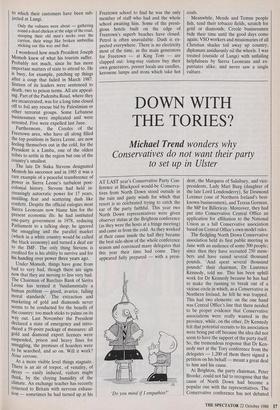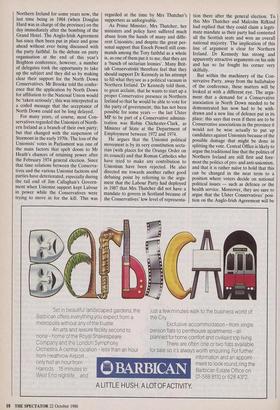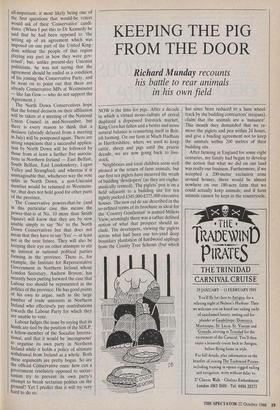DOWN WITH THE TORIES?
Michael Trend wonders why Conservatives do not want their party to set up in Ulster
AT LAST year's Conservative Party Con- ference at Blackpool would-be Conserva- tives from North Down stood outside in the rain and gusty winds for which that resort is so celebrated trying to catch the ear of the party faithful. This year two North Down representatives were given observer status at the Brighton conference (as they were the hosts at a fringe meeting) and came in from the cold. As they worked at their cause inside the hall they became the best side-show of the whole conference season and convinced many delegates that this year their time had come. They appeared fully prepared — with a presi- `Do you mind if I empathise?' dent, the Marquess of Salisbury, and vice- presidents, Lady Mari Burg (daughter of the late Lord Londonderry), Sir Desmond Lorimer (one of Northern Ireland's best- known businessmen), and Teresa Gorman, the MP for Billericay. Moreover, they had put into Conservative Central Office an application for affiliation to the National Union as a full Conservative association based on Central Office's own model rules.
The fledgling North Down Conservative association held its first public meeting in June with an audience of some 300 people; since then they have recruited 250 mem- bers and have raised several thousand pounds. `And spent several thousand pounds!' their chairman, Dr Laurence Kennedy, told me. This has been uphill work for Dr Kennedy because he has had to make the running to break out of a vicious circle in which, as a Conservative in Northern Ireland, he felt he was trapped. This had two elements: on the one hand was Central Office's line that there needed to be proper evidence that Conservative associations were really wanted in the province, while, on the other, Dr Kennedy felt that potential recruits to his association were being put off because the idea did not seem to have the support of the party itself. So, the tremendous response that Dr Ken- nedy met at the Tory conference from the delegates — 1,200 of them there signed a petition on his behalf — meant a great deal to him and his cause.
At Brighton, the party chairman, Peter Brooke, could not fail to recognise that the cause of North Down had become a popular one with the representatives. The Conservative conference has not debated Northern Ireland for some years now, the last time being in 1984 (when Douglas Hurd was in charge of the province) on the day immediately after the bombing of the Grand Hotel. The Anglo-Irish Agreement has since then been put in place and gone ahead without ever being discussed with the party faithful. In the debate on party organisation at the end of this year's Brighton conference, however, a number of delegates took the opportunity to take up the subject and they did so by making clear their support for the North Down Conservatives. Mr Brooke told the confer- ence that the application by North Down for affiliation to the National Union would be 'taken seriously'; this was interpreted as a coded message that the acceptance of North Down could not be long delayed.
For many years, of course, most Con- servatives regarded the Unionists of North- ern Ireland as a branch of their own party; but that changed with the suspension of Stormont in the early 1970s. The loss of the Unionists' votes in Parliament was one of the main factors that spelt doom to Mr Heath's chances of retaining power after the February 1974 general election. Since that time relations between the Conserva- tives and the various Unionist factions and parties have deteriorated, especially during the tail end of Jim Callaghan's Govern- ment when Unionist support kept Labour in power while the Conservatives were trying to move in for the kill. This was regarded at the time by Mrs Thatcher's supporters as unforgivable.
As Prime Minister, Mrs Thatcher, her ministers and policy have suffered much abuse from the hands of many and diffe- rent Unionists; and despite the great per- sonal support that Enoch Powell still com- mands among the Tory faithful as a whole is, as one of them put it to me, that they are a 'bunch of sectarian loonies'. Many Brit- ish ConservatiVei–therefore feel that they should support Dr Kennedy in his attempt to fill what they see as a political vacuum in Northern Ireland. Dr Kennedy told them, to great acclaim, that he wants to start up a proper Conservative presence in Northern Ireland so that he would be able to vote for the party of government; this has not been possible for some years — the last Ulster MP to be part of a Conservative adminis- tration was Robin Chichester-Clark, as Minister of State at the Department of Employment between 1972 and 1974.
He argues that the Unionist political movement is by its very constitution secta- rian (with places for the Orange Order on its council) and that Roman Catholics who have tried to make any contribution to Unionism have been rejected. He also directed me towards another rather good debating point by referring to the argu- ment that the Labour Party had deployed in 1987 that Mrs Thatcher did not have a mandate to govern in Scotland because of the Conservatives' low level of representa- tion there after the general election. To this Mrs Thatcher and Malcolm Rifkind had replied that they could claim a legiti- mate mandate as their party had contested all the Scottish seats and won an overall national majority. The implication of this line of argument is clear for Northern Ireland. Dr Kennedy has strong and apparently attractive arguments on his side and has so far fought his corner very skilfully.
But within the machinery of the Con- servative Party, away from the hullabaloo of the conference, these matters will be looked at with a different eye. The argu- ment that a demand for a Conservative association in North Down needed to be demonstrated has now had to be with- drawn and a new line of defence put in its place: this says that even if there are to be Conservative associations in the province it would not be wise actually to put up candidates against Unionists because of the possible damage that might be done in splitting the vote. Central Office is likely to argue the, traditional line that the politics of Northern Ireland are still first and fore- most the politics of pro- and anti-unionism, and that it is rather naïve to hold that this can be changed in the near term to a position where voters decide on national political issues — such as defence or the health service. Moreover, they are sure to argue that the Ulster Conservatives' posi- tion on the Anglo-Irish Agreement will be
all-important, it most likely being one of the first questions that would-be voters would ask of their 'Conservative' candi- dates. (When I put this to Dr Kennedy he said that he had been opposed to 'the setting up of an agreement which was imposed on one part of the United King- dom without the people of that region Playing any part in how they were gov- erned'; but, unlike present-day Unionist politicians, he was not saying that the agreement should be ended as a condition of his joining the Conservative Party, and he went on to point out that there are already Conservative MPs at Westminster — like Ian Gow — who do not support the Agreement.) The North Down Conservatives hope that the formal decision on their affiliation will be taken at a meeting of the National Union Council in mid-November, but there is every reason to think that a decision (already delayed from a meeting in July) will be postponed again. There are strong suspicions that a successful applica- tion by North Down will be followed by those from at least a further five associa- tions in Northern Ireland — East Belfast, South Belfast, East Londonderry, Lagan Valley and Strangford; and whereas it is unimaginable that, whichever way the vote splits in North Down, a non-Unionist member would be returned to Westmins- ter, that does not hold good for other parts of the province.
The Conservative powers-that-be (and in this particular case this means the Power-that-is at No. 10 more than Smith Square) will know that they are by now unable simply to say 'No' to the North Down Conservatives but that does not mean that they have to say 'Yes' — at least not in the near future. They will also be keeping their eye on other attempts to stir up interest in national political parties forming in the province. There is, for example, the Institute for Representative Government in Northern Ireland whose London Secretary, Andrew Bryson, has recently been putting forward the case that Labour too should be represented in the Politics of the province. He has good points of his own to argue, such as the large number of trade unionists in Northern Ireland who effectively pay contributions towards the Labour Party for which they are unable to vote.
Labour fudges the issue by saying that its hands are tied by the position of the SDLP, a fellow-member of the Socialist Interna-
tional, and that it would be 'incongruous' to organise its own party in Northern
Ireland while it holds a policy of ultimate withdrawal from Ireland as a whole. Both these arguments are pretty bogus. So are the official Conservative ones: how can a goverment resolutely opposed to sectar- ianism try to prevent its own party's attempt to break sectarian politics on the ground? Yet I predict that it will try very hard to do so.




































































 Previous page
Previous page